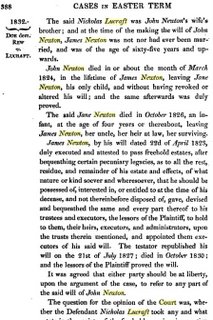
The story relating to the Hoop and Grapes, below, is a typical old legal wrangle about who has a right to property when a relative dies. The wills have already been proved, but Nicholas Lucraft feels that the outcome of the various inter-connected wills has not resulted in the bequest to him that he expected. He has challenged the result of the wills and the case is about who inherits if “the issue” of a person do not live until 21.
The story starts in Broadclyst where the Newton family and the Lucraft family have married each other over two generations that we know about. William Lucraft, born 1756 in Broadclyst was married in 1781 to Esther Newton. It is Esther’s gravestone that still stands in the churchyard there. Nearly all the known London Lucrafts were descended from this couple, who are my direct ancestors.
William and Esther had many children and you can see them all on the “Nicholas” tree on the website. One of them, Jane Lucraft, married a John Newton in 1822 at St Bride’s in Fleet Street. We hadn’t known that she had moved to London until we found this court record. It’s not yet clear how her husband was related to her mother, but it fairly sure that they were. The court proceedings are about John Newton’s will, and the wills of his brothers, Henry Newton and James Newton.
There are pages of argument, but the gist of it is as follows. Henry Newton was a wine merchant at 47 Aldgate High Street. The first London record we have of him is in Kent’s directory of London and Westminster for 1794, when Henry Newton is listed as a wine merchant at 47 Aldgate High Street. When Henry died in 1819, he left his property to his brother James Newton “for life”, and on James’ death the property was to pass to Henry’s nephew, Henry Newton, son of Henry’s older brother, John Newton. (continued overleaf.)
Henry died in 1819 without issue and left two brothers, James, old and also without issue, and John, whose son Henry was Henry’s nephew. When John died, his will left the property now in the occupation of his brother James Newton to Arthur Clarke and Mark Ashford who were leasing the premises at the time. (I haven’t yet found out who they were.) I think it was given in trust to them and then half was to go to Nicholas Lucraft and the other half to John’s daughter Jane.
We know that Nicholas Lucraft was working as a wine warehouseman around this time, and it is possible that he was working in the Aldgate warehouse.
However, all the legal argument arose because the owners of the lease that Arthur Clarke and Mark Ashford had, thought that they should have the property, because John had had issue, his daughter Jane, and because he had issue, and she had died aged four, the property came to them.
John, in his will had been very explicit about some of the conditions about descendants “attaining 21”, but not in the case of his own daughter, and because she had existed, the case for the property going to Nicholas failed.
Nicholas felt that because she had not attained 21 before she died, the will should be read as meaning “issue that survived to 21”, and therefore there was no issue to whom the property could go. Because there had been issue, the judges decided that the property could not go to Nicholas, and should go to the owners of the lease that Arthur and Mark had.
There was a lot of legal argument, and you can read it all on Google if you search for the three terms “Lucraft” and “Newton” and “Court of Common Pleas” together. The case itself was also used some years later to explain the precedents for handling the matter of issue who died before the age of 21. The papers do not say how William Pell Rew and Richard Baggullay came to be the owners of the lease, but given that there had been issue of John Newton, Nicholas didn’t get the property.
In 1824 Nicholas is described in his daughter’s baptism record at Shoreditch St Leonard’s as being a “gentleman of Haberdashers Street.” Nicholas had a son, William Lucraft, who was a wine cooper in 1850, and son William also had a son William in 1852, who was a wine cooper himself when he married in 1875.


1 Comments:
William Pell Rew named his 2nd son Henry Newton Rew.
b. 17 Sep 1807
d. 16 Feb 1886
William Pell Rew was a Lloyd's agent and his son Henry Newton Rew represented the same firm in Sicily where he dealt with wines.
I suspect that William Pell Rew and Henry Newton were longtime friends and business partners.
Noel Winter
By Noel Winter, at 3:54 am
Noel Winter, at 3:54 am
Post a Comment
<< Home